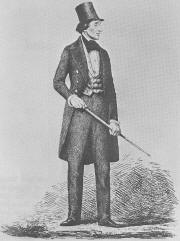|
A social outsider Throughout his life Andersen was an outsider, and one of the keys to the understanding of his nature is his loneliness. The restless old bachelor, who never managed to have a home of his own, lived in hotel rooms, in other people's guest rooms or, at best, in a couple of furnished rooms in Copenhagen. And there is plenty of evidence that he would have liked to have had a home of his own; on Christmas Day 1865 he wrote from one of the Danish manors where he was then staying, to a wealthy and generous friend in Copenhagen: "It is a happy and wonderful thing to have a home as you do. One understands that best when one has,
' I love your heart better than your crown, andyet there's a breath of something holy about the crown'
no home oneself and is a lonely migratory bird who must be grateful to find shelter under a hospitable roof."
Socially also Andersen was an outsider, as he was always very much aware. His slavish admiration for royalty, his obsequiousness towards princes and dukes, was surely linked with the fact that he was the son of a poor shoemaker and a washerwoman and that he was born in the age of absolutism when kings were still regarded as superhuman.

Royalty was above criticism as far as Andersen was concerned, but he always liked to pretend that he admired their souls more than their crowns; the nightingale is speaking with Andersen's voice when it says of the Emperor of China: "1 love your heart better than your crown. ..and yet there's a breath of something holy about the crown."
H.C.Andersen 1845, drawn by J.G.Gertner
Andersen's attitude to members of the aristocracy was far more ambivalent. It is true that he liked being treated as a welcome guest by members of the Danish aristocracy but it is also true to say that it was often they who took pride in showing off Andersen, rather than the other way round.
It is not too much to say that there was in Andersen an inborn positive dislike of aristocrats of the blood; they were associated in his mind with haughtiness, selfishness and stupidity. This attitude to blue-blooded aristocrats is clearly reflected in many of his prose works. While staying as the guest of Count Moltke at the manor of Glorup in June 1850, Andersen commented in his diary on the behaviour of some of the other guests: "It is terrible to hear the emptiness of the aristocratic world, hear them laying down the law decisively and unhesitatingly about everything, ignorantly, stupidly ." He was both surprised and annoyed when, in May 1854, he met a German Geheimerath in Dresden who " seemed to be very interested in aristocracy, and when he heard my 'Swineherd' he was astonished at the terrible satire as he called it". In March 1867 he reported that a certain Danish countess had told him that several people were amazed "that I who moved in the circles of the highest aristocracy should have written such a story as 'The Porter's Son'." |